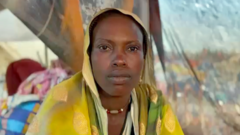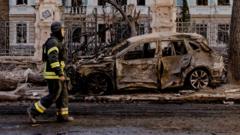The harrowing details of the 2013 sarin gas attack in Eastern Ghouta, Syria, which killed at least 1,500, continue to resonate. Survivors demand justice, as ongoing investigations seek accountability for war crimes amid the backdrop of a recovering nation after the civil war.
Survivors Seek Justice for Ghouta's Chemical Attack: Recalling a Night of Horror

Survivors Seek Justice for Ghouta's Chemical Attack: Recalling a Night of Horror
On the anniversary of the 2013 sarin gas attack in Ghouta, survivors recount their traumatic experiences as calls for accountability grow amidst Syria's ongoing crisis.
The night of August 21, 2013, remains etched in the memories of survivors in the Damascus suburb of Eastern Ghouta. A quiet summer night transformed into a nightmare as rockets struck the area, leading to chaos and death. Rescue workers arrived to find men, women, and children convulsing, gasping for breath, and ultimately succumbing to a silent, odorless killer: sarin gas. This incident marked the deadliest moment in Syria's protracted civil war, with at least 1,500 fatalities reported.
In light of this tragic event, many survivors are now rallying for justice. The attack, condemned globally, saw no immediate military response. U.S. President Barack Obama had previously issued a stark warning against the use of chemical weapons, declaring it a "red line." However, the lack of accountability for both President Bashar al-Assad and his administration remains a point of deep frustration for survivors and global observers.
Bashar al-Assad, who was driven from power amid a rebel offensive late in 2024, currently resides in Russia, shielded from prosecution. France prepares to file war crime charges against him and several associates, although the prospects of them facing justice appear slim due to geopolitical protections. Advocates argue that the sarin attack epitomizes the brutality of al-Assad's regime, indicative of the lengths to which he would go to retain control.
Investigators and witnesses have consistently underscored the significance of the Ghouta attack as a defining moment in the Syrian conflict, symbolizing the inhumane tactics employed by the state response. As survivors continue to share their harrowing accounts, the call for international accountability in the face of war crimes gains momentum, ensuring that the memories of those lost are not forgotten.



















